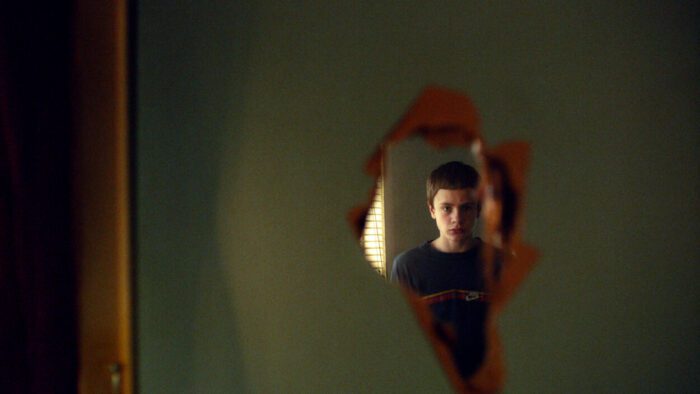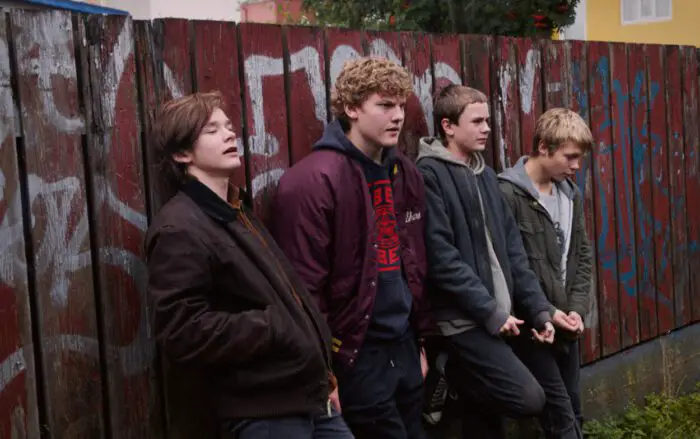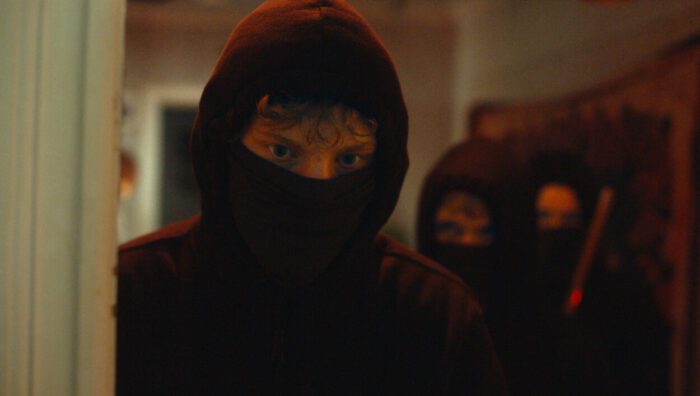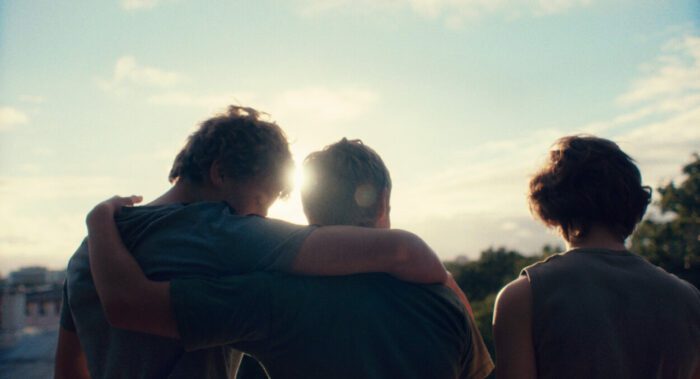Beautiful Beings (Icelandic: Berdreymi), the new feature from Icelandic writer/director Guðmundur Arnar Guðmundsson, whose 2016 feature debut Heartstone won over 50 international awards, is simultaneously beautiful and horrifying, a contemplation of boyhood and bullying that bubbles over into a boiling violence. Exquisitely shot and expertly acted, Beautiful Beings is a study of the tensions its characters face as they navigate the transition from adolescence to maturity.

In some ways, Beautiful Beings‘ narrative resembles the drifting, senseless days of the purposeless young Icelandic schoolboys it studies. Balli (Áskell Einar Pálmason) is an awkward misfit whose every day finds him the target of others. Addi (Birgir Dagur Bjarkason) takes pity on Balli and adopts him into his own gang of outsiders that includes the hulking bruiser Konni (Viktor Benóný Benediktsson) and the quiet follower Siggi (Snorri Rafn Frímannsson).

The gang of four bonds over little other than their own aggression. They don’t share a hobby or passion, only time—spent together over cigarettes, drugs, alcohol, pornography, and their own exchange of aggressions. Usually, those involve Konni’s torture of poor Balli, interrupted by Addi, the one of the four with at least a modicum of sensibility towards others. Konni, whose “fight or flight” response to conflict always takes the former, never shies from a chance to use his fists (or feet) to mete out whatever justice he deems others deserve.
While Konni’s brawn will sometimes protect the group, his rash actions eventually endanger them when he crosses paths with a vengeful gang of rivals or, worse, decides it’s up to himself to teach a suspected abuser a violent lesson. His actions are always motivated but hardly rational. While Addi and the others benefit from his protection, Konni’s violent propensities are a constant danger to his enemies and his friends alike.

Addi, meanwhile—the moral center of the film—is torn between his loyalty to his friends and his growing discomfort with their increasingly violent actions when push comes to shove comes to felonious, deadly assault. His concerns become all the more palpable when he begins to experience a series of dreamlike visions: these might be inherited or influenced by his mother, a self-declared clairvoyant, or by his experience with hallucinogenic mushrooms, but either way, they provide him a newfound intuition, one that might—or might not—guide his friends and himself towards a safer future.
Of the four young actors, none has any significant screen experience. The neorealist-inspired casting results in a wholly organic, naturalistic feel to Beautiful Beings’ narrative. The boys can snark, chide, bully, and punch each other and moments later, a tousled mop or a knock on the shoulder sets everything back right between them. Their bonds are such that they harbor no grudges, and when push comes to shove comes to far, far worse, one will be there for the other.
As Addi, Birgir Dagur Bjarkason has the most screen time, the most developed characterization, and the most significant character arc. And so he makes the strongest impression, his posture and glances reminiscent of a quietly confident River Phoenix, who he slightly resembles. But each of them, all Icelanders between the ages of 16 and 18, is excellent, even the hulking Konni, as is the supporting cast all around.
So too is the brilliant cinematography helmed by Sturla Brandth Grøvlen (The Innocents, Another Round), alternating between the Icelandic landscapes and the boys’ rough-hewn family homes and hideouts. Grøvlen and Guðmundsson make excellent use of restricted points of view in particular to heighten the suspense as the narrative reaches its climax. The few special effects that convey Addi’s visions are entrancing and persuasive, integrated subtly into the storyline and never employed without logic or reason.
Beautiful Beings, though, is not necessarily “beautiful.” The beauty referred to in the film’s title refers more to the boys’ potential than it does to their everyday existence. And sensitive viewers should approach the film with caution: the violence escalates from casual bullying to sexual and physical assaults which are depicted explicitly if not at all gratuitously. It’s worrisome to contemplate just how quickly and easily their youthful shenanigans result in consequences that can change their lives—and others’—forever.
That said, Beautiful Beings is a compelling study of modern boyhood. Its scenarios and characters are hardly limited to the modern Icelandic village it presents: boys like Addi, Konni, Siggi, and Balli exist, I imagine, nearly everywhere, teetering on the precipice between youth and adulthood, innocence and experience, the present and the future.

Written and directed by Guðmundur Arnar Guðmundsson, Beautiful Beings (Icelandic: Berdreymi) starring Birgir Dagur Bjarkason, Áskell Einar Pálmason, Viktor Benóný Benediktsson, Snorri Rafn Frímannsson, Aníta Briem, Ísgerður Gunnarsdóttir, and Ólafur Darri Ólafsson, opens January 13th at Quad Cinema in New York City with additional screenings to be announced at
www.alteredinnocence.net/beautifulbeings. In Icelandic w/English subtitles.



